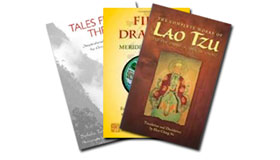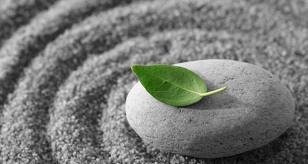
Solala’s Blog for the week of 2/25
My computer died a week and a half ago and I have been mourning it ever since. I have been without a computer and have had to borrow my girlfriend’s as a back up. Unfortunately, none of my programs are on it and I cannot do the usual projects. It is amazing how much I depend on it!
Of course I don’t need a computer do practice qigong or meditation. These things are very old-age and don’t required any special equipment or clothing. Just go within, plug into the great unending, ever unfolding Dao and there you are! Laozi says:
Can you hold the body and spirit as one?
Can you avoid their separation?
Concentrating your qi
And becoming pliant,
can you become like a newborn baby?
Clearing your mind and
contemplating the profound
can you remain unflawed?
In understanding all things
can you remain apart from them?
Can you bear the fruit without taking possession of it?
Can you do the work without taking credit?
Can you act without taking control?
Can you lead without dominating?
Can you speak without speaking?
Can you sit without moving?
One of the things that drew me to Daoism is the emphasis on using the energetics of the body to go beyond the body. Daoists fully inhabit their body yet also explore what lies beyond our mortal shell. But it does take a willingness to “sit without moving” and to learn to “speak without speaking.”
It can take a long time, as it has with me, to really understand these kinds of principles and then put them into practice. It can take a lot of effort to reach the state of wu wei or effortlessness. It seems so very simple to follow the we wei way but in the beginning as least, it takes a tremendous act of will to open ourselves up to the state of being able to “hold our body and spirit as one.” But the rewards are huge and the journey is as exciting as the goal.
My girlfriend Shanti and I had breakfast this sunday with our lovely friend Tegra. She shared with us her “not to do” list she does almost every day. Such as “Don’t get uptight about not getting too much done today.” If that isn’t the wu wei way I don’t know what is!
So I am working on my “not to do” list this week as well. Tomorrow the new computer arrives and I get to immerse myself in getting caught up on projects. But I will take my time, linger awhile on things and feelings “in between” and hopefully, experience some of that advice of the old master on “doing without taking control” and, every once in awhile, practice “speaking without speaking” and “sitting without moving.”
What Is Qigong?
by Solala Towler
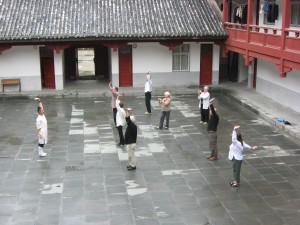
“What is this thing you do?”
he asked, hesitantly,
over the phone,
“this quee gong?”
(The transliteration of Chinese
being so ridiculous
that no one knows how to pronounce
anything they read.
Taiji teachers all over the country
still call it tai chee,
people do divination using the
eye ching,
meaning romantic love in Chinese.)
“Is it a martial art?”
he asks,
“or is it some kind of health practice?”
“well,” I answer,
it is a health practice,
it’s also a meditation practice,
as well as a spiritual practice.”
“Wow,” he says,
“all in one package huh?
What a deal!”
I suppose qigong
could be called
a sort of
psycho-spiritual-
energetic-meditation-
movement/exercise/routine.
Then again,
there’s no need
to get so technical.
Qigong is really
just something that I do,
like breathing,
like eating,
like dancing,
like making love.
Making love
with the universe,
you might call it.
An amorous, attentive,
articulated, attitude
of openness and grace,
an exchange
on a deep and basic level
on my inner being
with that of the great
undivided, unending,
undissolved Dao.
And with that exchange
comes balance, harmony,
a composure of spirit,
a deepening of character,
a relaxing of mind muscles,
a feel of safety,
of being at home,
of being empty
and full at the same time,
of being attentive to detail,
clear of vision,
open of heart,
soft yet strong
like water, like wind,
sensitive to changes
in the energetic atmosphere,
simply joy in beingness,
compassion for the sufferings
of those around me
as well as myself,
a sense of proportion,
of objectivity,
of opening to change,
transformation and miracles,
a greater sense of
who I am myself
and how I fit into
the grand scheme of things,
a deeper understanding
of how I fit into nature
and how nature fits
in to me.
Of course sometimes,
it’s just too hard,
too tedious, too boring,
too hot, too little sleep,
not in the mood,
no time, no quiet,
too much to do,
too much to understand,
too much to remember,
too hard to stretch,
to breathe,
to stop my madly
running mind,
I’m too off center,
too sad,
too anxious,
too impatient.
too spaced out,
too distracted,
too distraught,
too confused,
feeling hopeless,
out of whack,
deflated, defeated,
dissolved in my own
sense of importance
or no-importance.
But still, the practice,
the form,
the breathing,
the focusing,
the exchange
of light and darkness,
of form and of formlessness,
or yin and yang,
in out and out,
all sustains me,
uplifts me
out of my limited
sense of being,
my old tired patterns,
my old empty
emotional, mental,
physical and spiritual states,
those oh so familiar faces
of doubt, worry, fear
that we all carry
from childhood,
those past life
karmic hauntings
that hold so much power
over us
until we learn
to let them go,
release them
gently but firmly
into the great healing
eternal Dao.
As the ancient Daoists said:
We humans,
are stardust,
we are golden,
and we’ve go to get ourselves
back to the garden,
the garden of Dao,
the garden of heath,
vitality and spirit,
using and uniting with
the three treasures,
of jing, qi and shen,
those three shining jewels
of simplicity, patience
and compassion,
those three celestial guides
leading us back
to before the beginning
when Dao gave birth
to the oneness,
the oneness gave birth
to the two,
the endless spinning,
dancing polarity
of yin and yang,
and the two gave birth
to the three, those shining jewels,
those celestial guides,
which, in turn,
give birth continuously
to the ten thousand beings;
all that we see
and know and touch
and feel and experience.
Yes, I say,
this mysterious qigong practice
that practices me,
sometimes a struggle,
sometimes a dance,
but always a wise
and nurturing teacher.
Yes, it is something
that I hold dear and precious
like a light in my life,
like a treasure in my heart,
like a gift of the universe
which humbles me
and feeds me
with the sense of awe
that Laozi speaks about,
the sense of magic
and wonder
that Zuangzi jokes about,
the sense of honor
and propriety
that Kong Fu Zi teaches about,
that full feeling
of hope, serenity,
humbleness, thankfulness
vitality, gentleness,
and enlargement of the spirit
that all the great sages
speak about.
This qigong,
as dear to me
as the smile
on the face
of my beloved,
the firm yet loving
words of my teachers,
The clear-eyed vision
of my children,
the very centermost
core of my being,
eternal, vast
formless yet solid,
eternally present
while drifting aimlessly
thru the wu wei
of my spiritual
exultant, hopeful,
endlessly unfolding life.
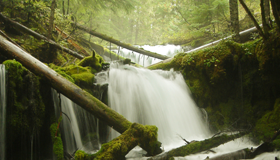 Solala’s Blog for the week of 2/11/13
Solala’s Blog for the week of 2/11/13
One of the things that drew me to Daoism is its deep connection to the earth. It prizes the yin over the yang. For without the earthy yin to act as a stabilizing force, the yang would have nothing to launch up from and would just dissipate. Laozi says, “Know the yang but hold fast to the yin.”
The other great image from Laozi is that of water.
Water benefits the ten thousand beings
yet contends with no one.
It flows in places that people reject.
In this way it is close to the Dao.
Chapter 8
Later on he talks about how water takes whatever shape of the vessel you put it in. If you put it in a round vessel it becomes round, if you put it in a square vessel it becomes square.
So to do we, as students of the Way, strive to become like water – flowing, humble, persistent, flexible and able to take on whatever shape of whatever situation we find ourselves in. (Especially helpful when traveling.)
Later on he says:
Great rivers and seas can act as
lord of a hundred river valleys.
This is because they flow downstream.
Therefore they can act as
the lord of a hundred valleys.
In this way, the sage who wants to be a guide to others
must place himself lower than them.
If he wants to lead the people
he must follow from behind.
Chapter 66
By holding this image of water and all its attributes as the goal of the sage or the self-realized person, we can find much guidance on how to live our lives in communion with the great and ever present Dao.
I would like to send a special invitation to my readers to join us on our pilgrimage to the sacred Daoist mountains of Maoshan and Wudangshan this spring. See the China Tour section of the site for more details. We will hike the trails to the holy temples, practice qigong in the sacred mountains of Daoism and eat amazing food!
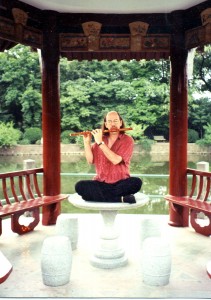 Solala’s Blog for the week of 2/4/13
Solala’s Blog for the week of 2/4/13
I encountered Daoism after struggling with a long illness (CFIDS for over ten years, until I was completely bed-ridden) and was curious as to the philosophical background to the acupuncture treatments I was receiving. I had been studying Zen for some time but there was something about the stiffness and solemness of Zen that I was not satisfied with. I had studied Eastern thought since the ’60’s and had practiced yoga and meditation for many years. But it was when I discovered Daoism, through the books of Hua Ching Ni, that I really felt a sense of ‘coming home.’
